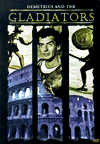Demetrius And The Gladiators (1954)
20th Century Fox Home Entertainment
Cast: Victor Mature, Susan Hayward, Michael Rennie, Jay Robinson
Extras: Theatrical Trailers
Rating:
"Demetrius and the Gladiators, " released in 1954, was the sequel to Fox’s box-office smash "The Robe, " which came out one year earlier and ushered in <$PS,widescreen> movie going with the introduction of Cinemascope. Whereas "The Robe" strove for piety and decorum in adapting the Lloyd C. Douglas novel about the robe that Christ wore and the immediate aftermath of the crucifixion, "Demetrius" spices up the continuing story of the Greek slave turned Christian (Victor Mature) with hearty doses of infidelity, man-eating tigers and gladiator combat. Definitely not in the dramatic caliber of "Ben Hur" or even as grandly bland as "The Ten Commandments," there’s still plenty of cheesy fun with this slab of ‘50s hokum and 20th Century Fox Home Entertainment’s new DVD release makes sure we get every pixel of toga tomfoolery with digital clarity.
The film opens exactly where "The Robe" left off. Freed slave Demetrius must keep his beliefs secret as Caligula and Roman law bears down on those who oppose the will of the state. Believing the robe a source of omnipotent powers, Caligula dispatches garrisons across the city to find the apocryphal garment. When Demetrius saves his friend Lucia (Debra Paget) from a soldier’s sword, he is arrested. Sentenced to gladiator training, Demetrius falls into the treacherous sights of Messalina (Susan Hayward), wife to Claudius, Caligula’s chief counsel, and patron of the gladiatorial school.
Intrigued by his religious devotion, Messalina embarks on an ambitious plan to corrupt and seduce Demetrius. He holds steadfast against her temptations until the sadism of another gladiator sparks an impulsive act of vengeance. Now fallen but still wrestling with his conscience, Demetrius must choose if he is to lead a life of compassion and temperance or march for an empire built from cruelty.
Parading the decadence of Rome makes for good crowd-pleasing entertainment, so long as a little religion and contrition balances out the excesses. "Demetrius" earns points for having Susan Hayward play the wayward Messalina; with her henna mane and sultry voice, any man would be nuts not to follow her to perdition. Victor Mature holds in his gut reasonably well, though his George Hamilton tan belies his oppressed state. Jay Robinson (late baby-boomers might more readily remember him as the villain on the old Sid & Marty Krofft show "Electra Woman and Dyna-Girl") gets the lion’s share of juicy lines with his volatile Caligula, and look for a very young Anne Bancroft in a couple of scenes. Not that "Demetrius" is a bad film; it’s just not a memorable one. Besides, there is no way any film, not even last year’s "Gladiator," could faithfully depict the moral or ethical morass of life during the Caesars without thoroughly revolting or depressing an audience. (Think Fellini’s "Roma" or "Satyricon.")
Colors just blaze here, thanks to the saturation of the old Technicolor process. Reds, purples, yellows just bloom here (judging from the rainbow array of colored togas, ancient Romans were just as fashion-conscious as today’s clothes hounds). Hues are brilliant and constant. Deep blacks and clean source elements, save for a few speckles and scratches, contribute a highly detailed picture. The disc cover proclaims a 2.55 aspect ratio, but on viewing reads more like the more common 2.35 frame shape. (Thank goodness; I’m know I’m going to outrage purists here, but squinting for three hours to decipher "Ben Hur’s" thin ribbon of color across a sea of black takes its toll.) Flesh tones run the gamut from natural to a hint of orange to even slightly grayish in a fleeting shot. Aliasing appears in a few scenes with fine details like relief walls or distant marble steps, but overall the image is sharp, clear and stable. Some special effects shots look a little rough, perhaps a combination of older effects technology and compression artifacts.
Audio options include a 4.0 discrete soundtrack as well as a matrix surround track. The <$DD,Dolby Digital> discrete recreates the "directional dialogue" common in sound mixes for <$PS,widescreen> films in the Fifties and Sixties. However, the effect might be disconcerting if the front speakers are spread very far from the TV or monitor. At least here it’s accurate; I’ve encountered directional dialogue audio on other DVDs where the sound definitely wandered from its correct speaker. Rear speakers on the discrete track are virtually silent whereas there’s some activity on the matrix surround audio, probably due to cross talk. Still, getting some music fill and crowd cheers help generate some excitement during the presentation.
The theatrical trailer for "Demetrius" constitutes the DVD’s only goodie… presented four times in four different languages! Practically the same in content and length, watching the trailer in English ("In the Miracle of Cinemascope!"), Spanish ("Con el Milagro del Cinemascope!"), French ("en Cinemascope!") and German ("Ein Meisterwerk in Cinemascope!") demonstrate that marketing superlatives transcend geographic boundaries. Trailers for five other Fox titles are included: " Titus," "A Midsummer Night’s Dream," "Patton," "The Longest Day," and 1992’s "The Last of the Mohicans." All are <$PS,letterboxed> (except "Mohicans") with decent audio and video.
"Demetrius and the Gladiators" is no substitute for reading up on real Roman history. While I wouldn’t build an evening at your home theater around it, watching it is like eating a banana split: rich tasting but filled with empty calories. Enjoy.







